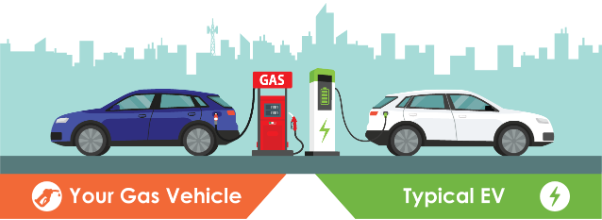EVs: High Energy Impact or Just a Charged-Up Fantasy?
Electric vehicles (EVs) are the talk of the town these days. Everywhere you look, there’s an ad promising a cleaner, greener future, and governments are pushing hard for everyone to go electric. But are EVs really the eco-friendly solution they claim to be? Like anything in life, the answer isn’t as simple as a yes or no. There are some fantastic benefits, but there are also a few hidden downsides that people don’t talk about enough. So, let’s break it down and see if going electric is really the best choice for the planet.
The Good Stuff: Why EVs Are a Green Dream

Goodbye, Tailpipe Emissions!
One of the biggest reasons people love EVs is that they don’t have tailpipes belching out smoke and CO2. Traditional cars burn gasoline or diesel, which releases all sorts of nasty pollutants into the air. EVs, on the other hand, run on electricity, meaning no exhaust fumes. That’s a win for cleaner air and healthier lungs, especially in big cities where smog is a serious problem.
Way More Energy-Efficient
Did you know that gas-powered cars waste a ton of energy? In fact, only about 20-30% of the energy from gasoline actually moves your car. The rest? Lost as heat. EVs, however, are way more efficient—up to 90% of the energy from the battery goes into actually powering the wheels. That means less waste and more bang for your buck.
Pair Them With Green Energy? Even Better!
If your electricity comes from solar or wind power, your EV becomes even cleaner. Imagine driving around knowing that your car is powered by sunshine or a cool breeze—that’s next-level sustainability. As the world shifts toward renewable energy, EVs have the potential to get even greener over time.
Less Dependence On Oil
Gasoline and diesel come from fossil fuels, which means drilling, refining, and transporting oil all over the world. EVs help reduce our reliance on oil, which can lead to less environmental destruction and fewer geopolitical headaches (aka wars over oil reserves). It’s a win-win!
The Not-So-Great Side Of EVs

Making Batteries Is Not As Easy As We Think
Here’s where things get tricky. EV batteries are made from materials like lithium, cobalt, and nickel, and mining these resources isn’t exactly great for the environment. Mining operations can destroy landscapes, pollute water sources, and even exploit workers in some countries. So while the car itself may be “clean,” the process of making it? Not so much.
Carbon Footprint During Their Birth
Believe it or not, making an EV can actually create more pollution than making a gas car—at least in the beginning. Battery production requires a lot of energy, meaning more CO2 gets released before the car even hits the road. Over time, EVs make up for this by being cleaner to drive, but it’s something to think about.
Where The Electricity Is Coming From?
EVs might not have tailpipe emissions, but they still need electricity. If your local power grid is mostly coal or natural gas, your “clean” car isn’t as clean as you think. The good news? Many places are shifting to renewable energy, but we’re not quite there yet.
What Happens To Old Batteries?
Batteries don’t last forever. After a while, they degrade and need to be replaced. So what happens to the old ones? Recycling EV batteries is still a work in progress. If not handled properly, they can become a huge waste problem, leaking toxic materials into the environment. The industry is working on better recycling solutions, but we’re not there yet.

Practical Concerns: Is Going Electric Worth It For You?
EVs Can Be Pricey
Let’s be real—EVs aren’t cheap. While prices are coming down, they still tend to cost more than traditional cars. Sure, you’ll save money on gas, and there are tax incentives in some places, but the upfront cost can be a deal-breaker for a lot of people.
Charging Takes Time
Unlike filling up a gas tank in five minutes, charging an EV takes time. Even the fastest chargers need at least 30 minutes to give you a decent boost, and home charging can take hours. If you’re someone who’s always on the go, this could be a major inconvenience.
Charging Stations Are Numbered
Gas stations? Everywhere. Charging stations? Not so much—at least, not yet. If you live in a city, finding a charger might not be too hard, but road-tripping in an EV still requires planning to make sure you don’t get stranded with a dead battery.
Battery Life And Replacement Costs
Batteries wear out over time, just like the ones on your phone or laptop. After a few years, you might notice your EV doesn’t hold a charge as well. Replacing the battery can be expensive, sometimes costing thousands of dollars. That’s something to consider if you’re planning to keep your car for the long haul.
The Future Of Evs: Can They Get Even Greener?

The good news? Scientists and engineers are working on making EVs even better. Here are some cool things on the horizon:
- Solid-State Batteries: These promise to last longer, charge faster, and use fewer rare materials.
- Better Recycling Tech: Companies are figuring out how to recycle old batteries more efficiently so they don’t end up as toxic waste.
- Cleaner Manufacturing: Automakers are finding ways to make EVs with less environmental impact, like using recycled materials and renewable energy.
- More Renewable Energy: As power grids get greener, EVs will naturally become a cleaner choice.
So, Are Evs The Greenest Option?

At the end of the day, EVs are a huge step in the right direction, but they’re not yet perfect. They have real environmental benefits, but also some hidden costs that we need to be concerned with. If we improve battery production, recycling, and renewable energy sources, EVs could become truly green.
So, should you go electric? If you can charge with renewable energy, afford the upfront cost, and don’t mind the occasional charging inconvenience, then absolutely! But if you’re expecting an EV to be a magical, pollution-free solution overnight, well, it’s a bit more complicated than that.
One thing’s for sure—EVs are here to stay, and as technology improves, they’ll only get better. The real challenge is Making sure that the “green” promise actually holds up for the long haul.
Author: Aaron Abraham Vivek
Resources:
https://www.epa.gov/greenvehicles/electric-vehicle-myths#Myth1
https://e-amrit.niti.gov.in/benefits-of-electric-vehicles
https://www.researchgate.net/publication/258849529_On_the_Sustainability_of_Electrical_Vehicles
https://www.sciencedirect.com/science/article/pii/S2210670724007741







3 Comments
Amal prakash
12 months ago💥💥🔥
Alan
12 months agoHey, this was such a great read! Loved how you broke things down in a super engaging way. The title’s catchy and the points you made really got me thinking. Keep up the awesome work, can’t wait to read more from you.
Jordan Smith
11 months agoThis blog offers a thought-provoking analysis of EVs, weighing their real energy impact versus the hype. A must-read for those exploring the sustainability, efficiency, and future of electric mobility.